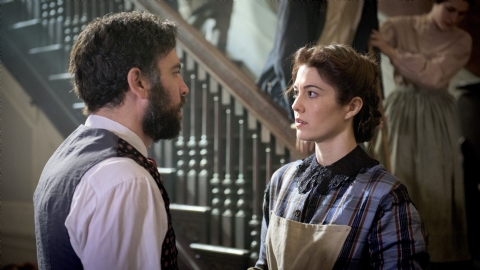By DAVID DUPONT
BG Independent News
PBS drama fans will hear new accents Sunday night.
After “Downton Abbey” with its familiar British turns of phrase, PBS will premier “Mercy Street” with decidedly American tone.
Not only is the setting and accent American, but the production is as well. That’s a major move for public broadcasting which has relied on BBC to provide its drama.
In May, 2014 when WGTE hosted Rebecca Eaton, executive producer of the “Masterpiece” franchise, she spoke with regret that there would not be an American equivalent of “Masterpiece.” Now a little more than a year and a half later, thanks to corporate support, we have just that. It also addresses another issue Eaton confronted during her visit, a lack of ethnic diversity in BBC’s offerings.
I would hope this is not a one-off. The presence of Ridley Scott at the helm as executive producer, is certainly a good sign. Can PBS recruit top American directors for future series?
Set in a hospital during the Civil War, “Mercy Street” explores distinctly American themes.
The choice of the Civil War is fitting for this effort. If class distinctions are a British obsession, the Civil War and America’s tortured history of racial oppression, is our country’s own obsession. We alternately ignore it and shout at each other about it. People are still dying.
At a recent preview screening at the WGTE studio in Toledo, the station screened a special collection of scenes from the first three episodes. Not the best way to assess a show, but enough to give a sense of what lies in store.
“Mercy Street” centers on a Union Army hospital in Alexandria, Virginia, in 1862, a propitious time. The hospital, already jammed with the wounded, disfigured, mauled and festering, is about to get much busier as Union commander George McClellan launches his Peninsula Campaign. Just a few miles away in Washington President Lincoln is preparing the Emancipation Proclamation.
But those large events seem secondary to the personal affairs of the characters.
The hospital is located in a luxury hotel owned by the wealthy Green family. Cathy Kamenca, WGTE’s TV program coordinator, likened them to the Crawleys of “Downton Abbey.” They are privileged and reluctant to give up their status and honor even under the noses of their Yankee occupiers. Their daughters Emma (Hannah James) and Alice (Anna Sophia Robb) question why they haven’t fled into Confederate-controlled territory as most other rebel sympathizers have. Both have beaus fighting for the Confederacy. Papa James (Gary Cole), however, is intent on holding his ground to protect as best he can his property and legacy. The family apparently has a dispensation that allows it to continue to enslave its African-American workers.
Emma decides that she will volunteer at the hospital to make sure the Confederate wounded receive good treatment.
Her opposite number is Mary Phinney (Mary Elizabeth Winstead), a New England abolitionist who has come south to nurse those she sees as fighting to end slavery. That slavery is an evil that must be abolished is not a view shared by all her northern counterparts, however. The arrogant surgeon Dr. Byron Hale (Norbert Leo Butz) grew up in a slave-holding family in Maryland. They tangle over their views on the issue. Is this feisty foreplay foreshadowing romance? I hope not, or maybe Mary Phinney is the Lady Mary of “Mercy Street.”
Phinney is given a rather elaborate back story as being the widow of a German baron, as if being a female abolitionist is not enough. It does give rise to some levity in the first episode, but I wonder how all this will play out.
Make no mistake this is far darker than any BBC fare. That much is evident as Phinney first approaches the hospital and a basket full of severed limbs is tossed from a second story window. Kamenca said it airs at 10 p.m. because of such details, and when it repeats Monday afternoons at 4 it will be flagged. The makeup is as gruesome as the costumes are lavish — true to the time and serves as a needed antidote to the romance that still shrouds the gore of Civil War combat.
We also meet Samuel Diggs (McKinley Belcher III), an African-American who shows unexpected medical skills. In his first appearance, he gives the young Yankee nurse an important lesson. Asked why he is carrying a rebel into the hospital, Diggs replies: “We take in whoever ends up here.”
Later Hales scolds Phinney: “Blood is not gray or blue. It is one color.”
Another free black, Aurelia Johnson (Shalita Grant) played a smaller role in these excerpts, but I suspect her role will grow as the series unfolds. In one scene, she urges a young enslaved man to step over into Union territory where he will be free. He wonders what awaits him there. What does freedom hold?
We are introduced to the Greens’ world with a scene showing Emma (though we see only her legs) getting dressed in all her southern belle finery. She’s actually being dressed. This is just the kind of costume detail that will thrill many viewers coming to this from “Downton Abbey.” But as Emma turns to study her image in the mirror we glimpse the impassive face of the black woman whose hands created this vision of elegance. The image is a fitting symbol for how the enslavement of Africans made the southern aristocracy possible.
How that theme is played out is just one of the reasons I plan to stick through the six episodes of “Mercy Street.”

